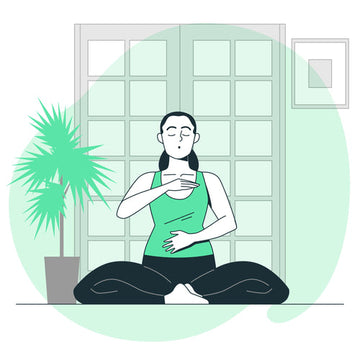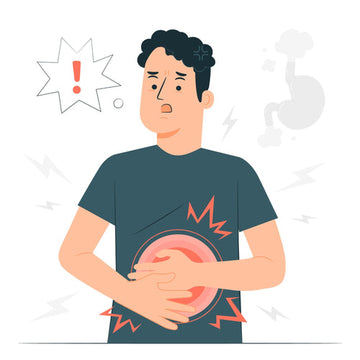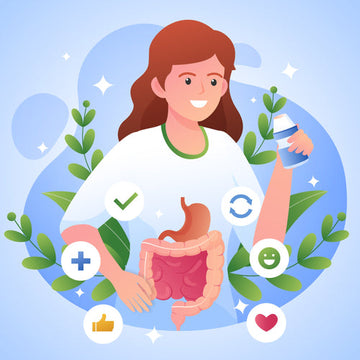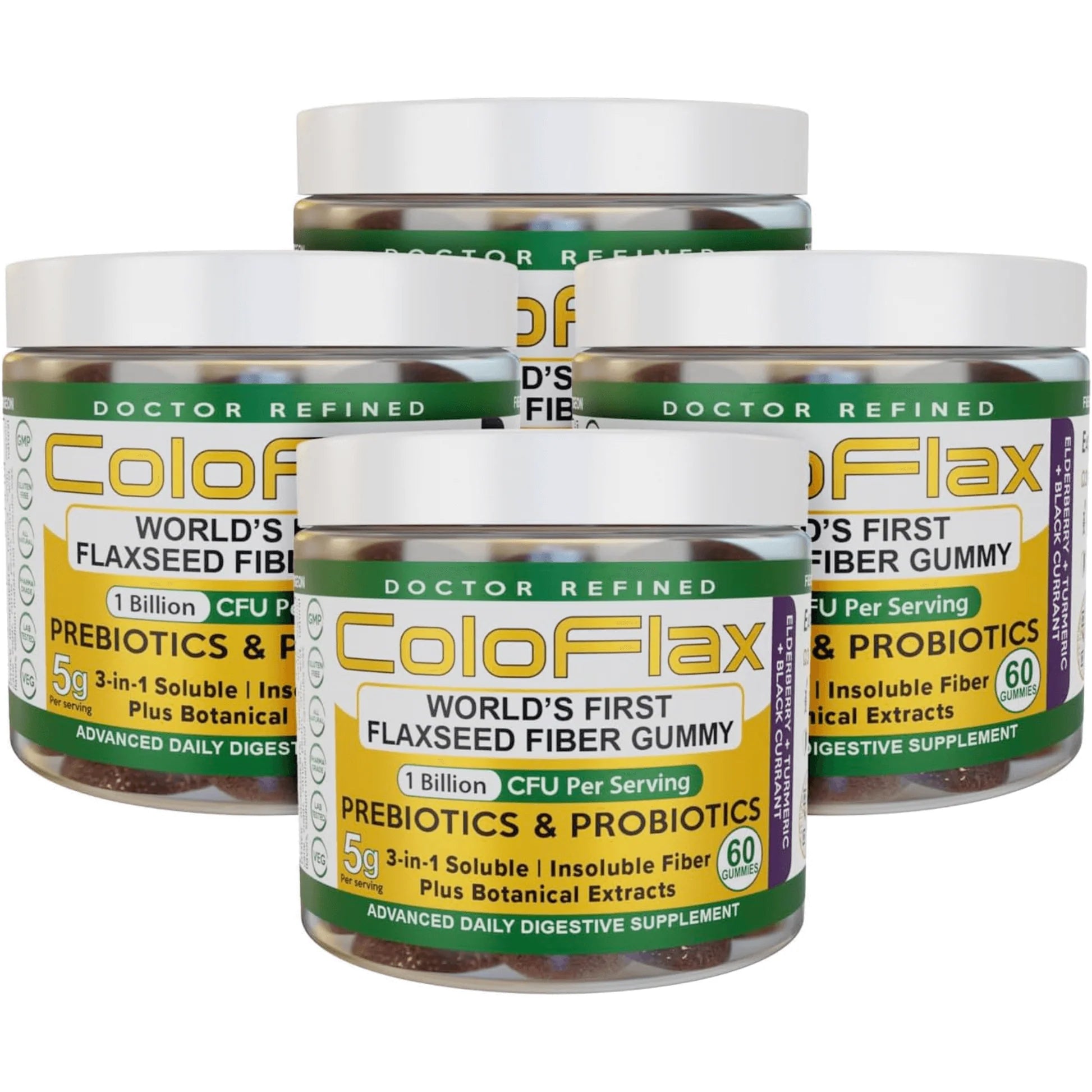According to the National Institute of Diabetes and Digestive and Kidney Diseases, between 60 and 70 million Americans suffer from digestive disorders and they lead to over 21 million hospitalizations a year. They are common and can be difficult, embarrassing, and even painful to deal with. Some are serious, others are minor, but many can be treated.
In the following guide, we’ll look at the most common of these conditions, highlighting the issues, causes, and possible solutions.
If you’re struggling with digestive symptoms and seeking a solution, this is the guide for you!
Heartburn
Heartburn is a burning sensation that’s caused by stomach acid traveling from your stomach to your throat. It occurs in the chest, ergo the name, but it has nothing to do with the heart. You may also have an unpleasant taste in your mouth due to the introduction of stomach acid.
If heartburn is not immediately resolved, it may present with a sore throat or hoarse voice resulting from minor damage to the throat.
Causes of Heartburn
Many people get heartburn at some time, though some suffer more than others. There are a number of triggers, most of which are food related. Fatty, spicy, and acidic foods can all trigger heartburn, with chilies, coffee, pastry, and butter being the most common triggers. Alcohol can also cause heartburn, as can smoking.
You are more likely to experience heartburn if you are:
- Overweight
- Pregnant
- Stressed
- Anxious
- Taking medications like NSAIDs
- Spend a lot of time lying down
Treatments for Heartburn
There are a number of over-the-counter remedies for heartburn. These include antacids (Tums, Rolaids), which reduce the acidity of the stomach; histamine H2 blockers (Axid AR, Pepcid Complete), which reduce the amount of acid in the stomach, and proton pump inhibitors (Nexium, Prilosec, Prevacid), which are best used to treat chronic heartburn and related conditions.
There are also some simple lifestyle and dietary changes that you can make:
- Avoid trigger foods and beverages
- Don’t smoke
- Don’t eat within 3 hours of going to bed
- Limit alcohol intake
If your heartburn is keeping you awake, try sleeping on your left side. Your digestive tract is not as symmetrical as you might think, and sleeping on your left prevents the acid from flowing up.
If you struggle with chronic heartburn that won’t go away quickly or easily, you may have a condition known as Gastroesophageal Reflux Disease or “GERD”. Speaking of which…
Gastroesophageal Reflux Disease (GERD)
GERD occurs when acid repeatedly escapes the stomach and flows into the esophagus, causing tissue damage. It can present as a result of obesity and exposure to many known triggers, but it can also result from a damaged or weakened esophageal sphincter, which typically stops the acid from escaping.
Treatment involves many of the same lifestyle and dietary changes mentioned above, as well as the introduction of medication. If you suspect that you’re suffering from GERD (repeat bouts of heartburn that even antiacids can’t remedy), speak with your healthcare provider.
Lactose Intolerance
Lactose intolerance is the inability to properly digest lactose, a sugar found in milk. It can lead to symptoms such as bloating, gas, diarrhea, and general digestive discomfort. Although it’s mostly harmless and rarely associated with any serious condition or increased risk, it can be very uncomfortable and embarrassing.
Causes of Lactose Intolerance
Lactose intolerance occurs when there is very little lactase in the small intestine. Lactase is an enzyme that digests lactose, and if there’s not enough of it, the sufferer may experience digestive discomfort when they consume dairy products.
Treatments for Lactose Intolerance
The most common treatment for lactose intolerance is to limit lactose consumption. Avoid dairy where possible and limit yourself to small amounts where not. If you can’t avoid lactose-containing foods, save them for dinner times, as consuming them with other foods can help with the digestive process.
You should also try experimenting with dairy to see which foods cause the worst symptoms. You may find that you’re able to consume hard cheeses without issue, for instance, as these typically have very low levels of lactose.
There are also lactase enzyme tablets that can help your body to digest lactose. These include Lactaid and they are available over the counter. However, they don’t work for everyone.
Hiatal Hernia
Hiatal hernia is when part of the stomach pushes through an opening in the diaphragm. It can produce symptoms such as chest pain and difficulty swallowing, and may also lead to chronic heartburn.
Causes of Hiatal Hernia
Although the exact cause of hiatal hernias is not known, there are some known triggers and risk factors, including smoking, obesity, and age, with the condition being more prevalent in the over 50s.
Treatments for Hiatal Hernia
Hiatal hernia treatments include medications to control stomach acid and lifestyle changes such as eating smaller meals, not lying down after eating, stopping smoking, and losing weight. In severe cases, surgery can be performed to repair the hiatal hernia and prevent symptoms.
Peptic Ulcer Disease
Peptic ulcer disease is the result of ulcers in the lining of the stomach or small intestine. Usually, the stomach is protected from its own digestive juices by a layer of mucus, but this can become damaged, thus exposing the stomach to the harmful acid.
Some of the symptoms associated with peptic ulcer disease include:
- Heartburn
- Bloating
- Nausea
- Vomiting
- Abdominal pain
- Weight loss
- Black stools
Causes of Peptic Ulcer Disease
Some of the risk factors for peptic ulcer disease include frequent use of anti-inflammatory painkillers, such as ibuprofen. Smoking and excessive alcohol consumption can also cause this condition, and it’s more common in people who have a family history of ulcers, as well as those with kidney, liver, or lung disease.
A type of bacteria known as Helicobacter pylori (H. pylori) can also cause peptic ulcers.
Treatments for Peptic Ulcer Disease
Ulcers can sometimes heal on their own, but reflux medication can be prescribed to manage the symptoms. If the ulcer is caused by H. pylori bacteria, antibiotics can be used to kill the bacteria.
If you suspect that you have this condition, speak with your doctor about your treatment options.
Non-Ulcer Dyspepsia
Non-ulcer dyspepsia (NUD) presents with the symptoms of an ulcer, including indigestion and heartburn, but an ulcer is not present. It often affects young people and seems to be more common in women than men.
Causes of Non-Ulcer Dyspepsia
The causes of NUD are not clear, but there are a few theories and correlations, including the presence of H. pylori bacteria and irritable bowel syndrome. Diagnosis is usually made after acknowledgment of symptoms like heartburn, indigestion, and bloating in the absence of peptic ulcer disease and other possible causes.
It may also be a result of anxiety and stress, as well as extremely emotional life events.
Treatments for Non-Ulcer Dyspepsia
The treatment of NUD will depend on the individual case, as there are many potential causes, symptoms, and triggers. It could include managing stress and anxiety levels, as well as OTC medications for heartburn, and lifestyle/dietary changes.
Indigestion
Indigestion is not a disease in itself, but rather it’s a symptom of other gastrointestinal issues, including many of the ones highlighted in this guide. It can make you feel uncomfortably full after a meal with pain and discomfort in your upper abdomen. It may occur alongside heartburn.
A simple tea made from peppermint or chamomile will help to soothe the symptoms. Ginger and apple cider vinegar can help too, as can adding a little baking soda to warm water and drinking it.
Bear in mind, however, that some of these remedies may worsen your heartburn. They are not advised if your indigestion is a symptom of GERD and is accompanied by heartburn.
Gastroparesis
Gastroparesis is also known as stomach paralysis. It affects the muscles in the stomach and means they can’t process food effectively or empty easily. It impacts the entire digestive process and results in a number of symptoms, including:
- Abdominal pain
- Nausea and vomiting
- Indigestion
- Bloating
- Loss of appetite
- Heartburn
- Constipation
- Fluctuations in blood sugar
Causes of Gastroparesis
Many causes of Gastroparesis are idiopathic, which means the cause cannot be determined. The most common cause is diabetes, though, and this condition is responsible for approximately a third of all gastroparesis cases.
Treatments for Gastroparesis
There are a number of different treatments for Gastroparesis, and they vary depending on the cause. They can include surgery, medications, and hydration therapy. Some of the medications prescribed to treat this condition include metoclopramide, which is the only medication that has been approved by the FDA for the treatment of gastroparesis.
Gastroenteritis
Gastroenteritis is a condition characterized by inflammation of the digestive symptoms. It may result in diarrhea, cramps, and vomiting. It’s a short-term condition, usually lasting for between 1 and 3 days, but it can be extremely unpleasant and may leave the individual bed-bound for the duration.
Causes of Gastroenteritis
Gastroenteritis is usually caused by an infection, whether from bacteria, parasites, or viruses. E.Coli and campylobacter are the most common and both result from poor sanitation and improper preparation of food.
Treatments for Gastroenteritis
The cause will determine the best course of treatment, but gastroenteritis is usually treated by keeping the patient hydrated. It can be treated at home with lots of fluid intake, but if the condition worsens and the individual is unable to retain fluids, hospital admission may be required. Drugs can also be used to kill bacterial infections or destroy parasites.
Chronic Constipation
Being constipated doesn’t mean that you haven’t been to the toilet at all for several days. It is actually prescribed when you have less than 3 bowel movements per week. Chronic constipation is when this issue persists for several weeks or more.
It can lead to a constant feeling of fullness, as well as abdominal pain, difficulty passing stools, and general digestive discomfort.
Causes of Chronic Constipation
Chronic constipation has a number of causes.
Sometimes, it’s related to diet and lifestyle. Your bowels need fiber to function properly and plenty of water to prevent stools from getting too dry. It also helps if you move around. If you eat a diet that’s low in fiber and high in fat and you spend most of your time sitting down, you may suffer from regular bouts of constipation.
Some medications may worsen the condition, with opioids being one of the main culprits.
Other causes include:
- Ignoring the urge to use the toilet
- Fecal impaction
- Depression
Treatments for Chronic Constipation
Laxatives are often the first-course treatment for constipation. They are effective, but only in the short term. A laxative like Dulcolax or Ex-Lax will help to stimulate the bowel and produce a movement. They could clear you out and provide the relief you need. But then what? If the underlying cause isn’t treated, the problem will return.
What’s more, excessive use of laxatives can make the bowel lazy.
Instead, focus on increasing your intake of fiber, water, and gut-healthy nutrients such as omega-3 fatty acids, probiotics, and prebiotics.
Fiber supplements can also help. ColoFlax, for instance, contains a high dose of both soluble and insoluble fiber, as well as probiotics, prebiotics, omega-3 fatty acids, and healthy plant extracts.






